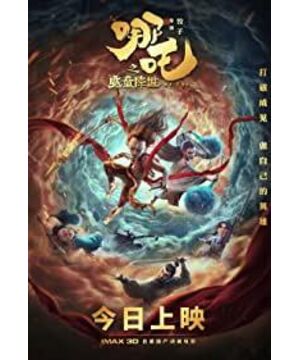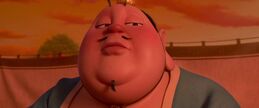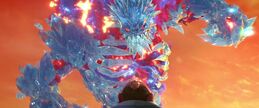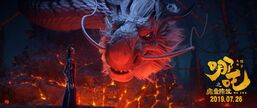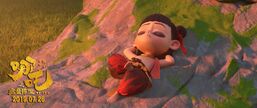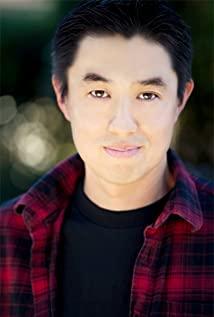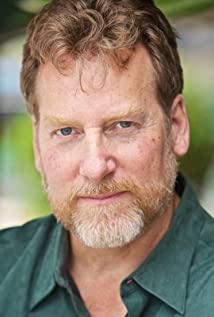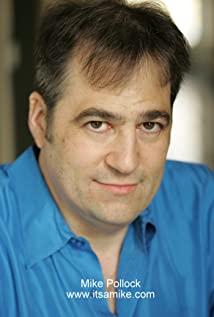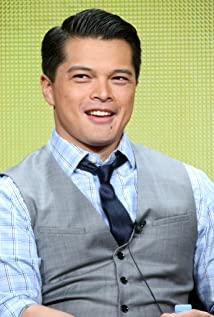Originally, I wanted to write "Nezha: Devil Child Comes into the World", but after thinking about it, I should change it to "fineness", which seems to be less emotional.
This cartoon, hereinafter called "Magic Child" (because the director said that he wants to play subversion, it can't be called "Nezha") I just don't like the promotional clips and character modeling. And I knew at a glance that this was a score and traffic hyped by the Internet, and I didn’t want to get involved with this filthy and fake data, the topic of conformity, and it was not a self-media that lived by catching up with the hot spots.
After watching the movie, I felt uncomfortable from the inside out, and I didn’t want to say a word about the things I didn’t like at first, but after the discomfort, I was keenly aware of why it was popular and why it was so popular, and felt the need to write about it.
Let's talk about aesthetics, character modeling, action special effects, and representational media:
When I saw Nezha in "Magic Boy", my first impression was that this image is not a human, but a little monster, copied from little monsters in Hollywood and foreign animations - big teeth, white eyes , dark circles under the eyes, evil elf-like character, weird expression that always gloats at misfortune, animal nature is more than human nature, little monster who loves to play with no brains.
For example, Stitch from "Interstellar", Toothless from "How to Train Your Dragon", and many little monsters that I can't call out at once.
There are also bugs from the Korean junior animation "Laughing Bugs", which feature big round bulging eyes and a Korean-style cheap expression. They use mischief as a joke. After doing bad things, they cover their mouths behind their backs and laugh.
Nezha is even more cheap than these little monsters, how can such a trifle become the protagonist?
Secondly, the director is a big fan of Stephen Chow and Hong Kong-made vulgar shit comedy. All the humor in the film comes from the imitation of Stephen Chow and shit and piss comedies. The director probably grew up watching these from a young age. There is no other fun and no other cultural resources to use, so he can only think of this.
A big man with a female voice - "Flowers" in Stephen Chow's movie.
Nezha and the other children didn't know how many times they urinated, Taiyi Zhenren kept farting and Yaksha's nose.
"Fu Mo Gang" - Axe Gang.
The characters' speech and actions, exaggeration, misunderstanding, coincidence, etc., all come from Stephen Chow and Hong Kong comedies. Many scenes can see the shadow of "Journey to the West", "Kung Fu" and "Journey to the West: Conquering the Demons". Zhou Xingchi and Wang Jing are old, and Hong Kong's nonsensical and shit are revived in the mainland "Guoman".
In Stephen Chow's movie, peeing becomes a water gun. Wang Jing, the famous director of "urinating device", is also very pleased with the successor. I feel that in the future, the urine in our country's animation will flow back into a river.
These humors caused the children in the theater to laugh constantly, and the younger children liked excrement jokes the most.
Again, Hollywood is everywhere. Isn't Shen Gongbao the villain of "The Avengers" Ebony Throat?
Baby Nezha is like a super baby in "Super Commando".
Li Jing went to Tianzun, the "Little Yunyun" at the door is a typical Disney image, a slender stick-shaped little doctor wearing glasses, such as fear in "Inside Out", "Invincible Destruction King 2" in Search Engine Dr.
Nezha practiced martial arts in "Jiangshan Shejitu", and practiced in virtual reality from "X-Men".
The magic pill conjured a red laser magic circle, apparently from the blood infiltrating the altar in "Hellboy".
"Kung Fu Panda" is of course indispensable, Kung Fu Panda-style environment, villages and villagers.
A few years ago, the action scenes in "The Return of the Great Sage", the scenes of free sliding on the suspended mountains and roofs, all came from when the main creator was in the United States, and learned from the "Kung Fu Panda" team. as the main selling point.
"Magic Boy" has a lot of sports and fighting scenes. It is a continuation of "The Great Sage". In many cases, it is completely procrastinating to make up the numbers to demonstrate domestic animation technology. It has not been a waste of money in recent years.
There are a lot of special effects, actions, and paragraphs in "Magic Child" that have nothing to do with the theme and plot. We rely on this to make up time, because the theme and plot itself are very bad and illogical.
In addition, the pointed chins of Ao Bing and Nezha have the color of Japanese comics, which is different from the aesthetics of my country's round sky, New Year picture dolls and door gods.
All of them are foreign and foreign, without the traditional "national" of our mainland inland ethnic groups? some. The character modeling always has a kind of "Bear Bear II"-style rustic and twisted domestic "animation industry base" level, unifying the mixed and unharmonious non-original elements under this rustic style.
Add some "national style" and "folk customs" embellishments, similar to the tulou in "Big Fish and Begonia". The heroine wears a red cheongsam and adds it bluntly. There are no national symbols that have been verified, and the strange "Fujian style".
"Magic Child" is "Sichuan": although the concept of "enchantment" is a full-fledged Japanese import, the two gold-masked "enchantment beasts" guarding the enchantment and the painted pottery pot that Taiyi real person drinks from are from Jinsha Site and Sanxingdui Site in Sichuan. But that is a primitive society, does it match the era in the film? No matter what, the director will use these elements to prove that I belong to the nation and local folk customs!
Well, now is the key point. People with culture always look at the thoughts, connotations and values of movies. I think it is necessary to talk about the classic version of "Nezha Naohai" by Shanghai Fine Arts Film Studio in 1979.
In this version, the people of Chentangguan are deeply oppressed by the Dragon King, and they have to pay tribute to boys and girls every year. The parent official Li Zongbing does not stand up for the people, but instead seeks perfection, and defaults to this dark rule.
When Nezha was seven years old, the drought and the earth cracked, and the water did not fall. The Dragon King ordered Yaksha to go to the beach and rob boys and girls. Nezha killed Yaksha and killed Ao Bing, the Dragon Prince who came to reinforce him.
The Dragon King of the East China Sea invited three brothers, flooded Chentang Pass, and devastated countless lives, asking Li Jing to hand over Nezha. For the safety of the people in the city, Nezha stepped forward and killed himself in grief and anger. The real Taiyi borrowed lotus and fresh lotus as his body to make Nezha revive his soul. After the resurrection, Nezha held a fire-pointed spear and stepped on a hot wheel to make a riot in the Dragon Palace, defeated the Dragon King, and killed the people.
In 1979, Nezha was an anti-pan ideal and the embodiment of justice. The scene of Nezha committing suicide was the climax of the drama. Such decisiveness was a fierce confrontation between pure ideals and dirty reality, and the courage to die rather than freedom.
Taiyi Zhenren is the spiritual father of Nezha. He admires Nezha's intelligence and rebelliousness, and he knows that this seemingly stubborn child can achieve great things, and can make a new gap in the unshakable darkness. Nezha broke with Li Jing, his father in the flesh, dull, pedantic, stubborn, bureaucratic, stern, cowardly and irritable, who concentrated all the shortcomings of adults.
What Nezha is resisting is not only the darkness of reality, but also the patriarchy that has existed for thousands of years. The real Taiyi used lotus and lotus to recreate his body, reborn, and completely abandoned all connections with the world. Worry, there is only a pure and detached true soul.
There is a contrast between the world of youth and the world of adults, between pure ideals and dirty reality. Break down the people and systems of oppression and exploitation, and yearn for an ideal world of fairness and justice.
At that time, the revolution was not far away, and of course it still had the color of the times. The young general had bright eyes, and under the guidance of a spiritual father, he went to smash the ministry of the elders and restore absolute justice. Even if you lack interest in the leftist spirit, Nezha is a rare anti-pan image in Chinese history, pure idealism, and a manifestation of truth, goodness and beauty.
So what exactly is the new version of "Nezha: Devil Child Comes into the World"? The world in the film has three realms: The highest class is the immortals, who are high above and unshakable. The representative figure Tianzun created the spirit pill and the magic pill, and designed a future middle and lower level turmoil - the turmoil created by Gao Cen, and everything is under control.
The middle class is the human world. Nezha is the son of the chief soldier of Qiantang Pass, the second-generation official in the yamen. He has been pampered since he was a child.
The lower level is Ao Bing and the Dragon Clan. "In ancient times, the Dragon Clan was the leader of the Bai Ling. Later, he surrendered to the Heavenly Court and suppressed countless monsters in the sea, and was able to be named Dragon King. But the Dragon Palace is actually a Heavenly Prison, and the Dragon Clan is a high-ranking jailer, who was also imprisoned."
In the film, the dragon family is miserable, imprisoned by chains, and living in a dark, hell-like dungeon. The dream is to turn over to be the master, and become an upper-level immortal at one time. The dragon family is powerful - the lower level is pregnant with a huge temple covering power, and it has to be guarded.
The existing system is that "heterogeneous people cannot ascend to immortals", and people at the bottom of the census will not be able to ascend in their entire lives, so don't even think about it.
And Nezha, the second-generation official, taught Ao Bing, his lower-level children, "I can change, and so can you!" I was originally a magic pill, and I wanted to kill the Quartet, but I have changed, and it has become better.
These "heterogeneous" Ao Bing are destined to bear the original sin all their lives. Even if they sold their blood for the above, and made great contributions, they would still be made a separate book and treated differently. In the film, although Ao Bing looks like a handsome son, he is actually full of sorrow and hatred.
At the end of the film, Ao Bing said, "I am a demon, and my destiny is set from birth."
But Nezha said a series of cool big words and chicken soup to Ao Bing: "Fart, only you have the final say on what you are, and if your fate is unfair, just fight it to the end."
"My fate is up to me, whether it is a demon or a fairy, I have the final say."
"The prejudice in the heart is a mountain"
Yes, you came out of the belly of a human being, you were born a human being, and you can easily write and decide whether you are a demon or a fairy. You cheap ones, come to educate these outliers who will always be second-class citizens. If it is really as cool and light as you said, the dragons are bound by chains and live in hell, so why bother?
And until the end of the film, the dragons were born with a heterogeneous system of inequality, which has not changed at all.
To add a background to this system: "Magic Boy" incorporates the myth of Nezha into "Fengshen Romance", because Nezha and Taiyi are also the characters of the latter.
The setting in "Fengshen Romance" is a dispute between Intercept and Interpretation. Intercept pursues equality and advocates that there is no difference between teaching and learning. Any wood, stone, monster, bird and beast can become immortals, while Intercept engages in species discrimination and only allows people to become immortals. Aliens are not allowed to become immortals, they are born with low duan species.
I thought that it would be much easier to understand if "Fengshen Romance" was regarded as the pre-history of "Magic Child". The last big shuffle of the war has ended, the teaching has won, and the rules of order have been set and cannot be changed. Different types thought about it, and could only choose to obey.
We now have a lot of domestic movies, which either arouse the sympathy of the middle class for the lower class, and call the middle class to help the lower class.
Either the middle class helps the upper class to "share the worries" and educate the lower class to be moral and not to make trouble. Instead of questioning and discussion, use some kind of moral inquiries to paint some cheap human colors.
"Magic Child" knows it well. In the end, Nezha and Ao Bing became friends, the two classes were in harmony, and the chaos subsided.
If the 1979 version of Nezha was "from human to god", Nezha was reborn and became an ideal incarnation, while "Magic Child" is "from strange to human", from a heartless and unknown little monster, ( Add some self-pity, low self-esteem, and arrogance of some young people today, who feel that they are not understood, but like to fool around and be irresponsible). In the end, there is some kindness, commitment, and sacrifice of humanity, although it is also very light. And this person is a very small and narrow-minded person, by no means a "capitalized person", and has nothing to do with grand meanings.
The upper-level representative in "Magic Boy", Tianzun, except for the turmoil at the beginning, he has been in retreat since then, but everyone fears him, everyone talks about him, everyone is not in authority, and "absent is present".
Secondly, we all know that contradictions and conflicts are the decisive factors to promote the development of the plot. The contradictions in the film reflect the contradictions in reality. The contradictions continue to develop and intensify. Finally, the contradictions in the film are resolved imaginatively, which makes the people watching the film comfortable.
The Theory of Contradiction says that it is the contradiction that drives the change and development of things. But there are no contradictions in Chinese films, there are no contradictions, and pseudo-contradictions can only be the development of pseudo-plots.
There is no resistance in "Magic Child", nor is there any real contradiction.
For example, the biggest bug, why was the magic pill given to Nezha and the Ling Wan given to Ao Bing? If the Dragon Clan wanted to rebel against the Kingdom of Heaven and Heavenly Venerate, why not use the magic pill?
Because Shen Gongbao and the Dragon Clan didn't want to resist at all, they didn't target the Heavenly Sovereign, but the human world.
What they are thinking of is not to overthrow this unreasonable system or replace it with the gods, but to create a false turmoil in the world, and then pretend to calm down, so as to invite credit from above, gain the trust of above, enter the house, and wash away the original sin. "When the magic pill expires, the killing will be kicked off, Nezha will kill Chentangguan, and then let Ao Bing save Chentangguan."
However, after spending so much effort, it is definitely not to overthrow it, but to gain favor, and it is a firm defender.
This is even more unreasonable. The system of heterogeneity is always heterogeneity, and it can only be controlled and guarded. Just like the Songjiang peasant uprising was recruited and banned from official positions, and the court arranged to recruit Fang La to "rule the bandits with bandits", and most of the casualties were , Give poison and wine to kill them, this is the only fate.
Delusions of entering the house are foolish dreams, being born is the original sin, gathering and being strong is the original sin. It seems that although the dragon looks powerful, it is a beast after all, and this IQ is really not high.
Ao Bing and the dragon clan hope to create a magic pill incident, become famous, remove the identity of the monster, make the heavenly respect, become a real immortal, rank in the immortal class at the ceremony of conferring gods, take off the identity of the dragon clan, and train the dragon on the head. Corner, let the clansmen enter the room in one fell swoop. The purpose and original intention is still to show loyalty and identify with the system.
The same is true for Shen Gongbao, who is diligent and hardworking, with high mana and scheming. In terms of temperament, he is much stronger than the fat and stupid Taiyi Zhenren, and he is also a senior brother. Just because it is a leopard cultivation, it is not valued by Heavenly Venerate, and it is not aspiring. The purpose of his game is to squeeze into the Twelve Golden Immortals, probably the Standing Committee or something.
Also, that risk factor—“Magic Pill” and the reincarnated “Magic Child” are actually not dangerous, and they do not constitute a party to conflict or resistance.
It is said in the film that after the reincarnation of the magic pill, there will be a catastrophe on the third birthday of the magic boy, and the thunder will hit the top, destroying the magic boy. The devil boy Nezha would have been taken away, there is no need to stop him, there is no need for that ending battle.
The film uses the theme of "self-choice, free consciousness" in Western movies, such as Harry Potter's choice of Gryffindor or Slytherin, whether to choose light or darkness, good or evil, and grow in choice.
But the devil boy Nezha actually has no choice and is destined to be completely different from Western movies.
Since there is no contradiction, no conflict, no resistance, and even no distinction between good and evil, everything is just water without a source, rambling. Including his parents had long known that Nezha was a magic pill and would die at the age of 3, so they doted on him and hid it from him. Nezha doesn't understand the painstaking efforts of his parents and is stubborn. There is no evidence for these extended plots, and there is no evidence for emotions, which seems empty and pediatric. "A chaos with a doomed ending."
Since contradictions are removed from the core, there is no longer any logic. In the film, Yaksha spit bubbles and petrified, followed by a completely unprovoked fight. Nezha doesn't like Ao Bing, who is handsome and elegant, just because he looks "very pretentious". This attitude is really low-grade, very dirty. Nezha picked up the petrochemical Ao Bing and smashed the Yaksha, and also deliberately disgraced the "pretend" person, which was boring and diaosi.
Immediately afterwards, there was another battle against the villagers, an unnecessary fight that dragged the time.
Fliggy turns into Hot Wheels, which is inexplicable. Noisy, messy.
Nezha rescued the girl, but the villagers thought it was him who kidnapped him. There are such unreasonable injustices, deliberately created plots, and everything. I just want to sum it up in one sentence from the film——
"Are you insulting my IQ?"
The 1979 version of "Nezha" is very elitist. It is rebellious, ideal, pure and noble in its bones. Now "Magic Boy" is no longer rebellious - cowardly, no longer elegant - vulgar.
Spiritually, you must be obedient and obedient, understand, share your worries, and don't be fanatical. Shouting "don't accept fate" is just a gesture of self-pity and narcissism, but it is the most accepting fate, the most understanding of fate, and also teaches people to accept fate obediently.
The propaganda is marked with "Guoman Revival", with the national prefix.
In business, I study from the most grass-roots vulgar entertainment and the most profitable Hong Kong shit, urine and fart comedy in the 1990s. Long live diaosi, whoever wins diaosi wins the world.
Add in some young people's unreasonable, illogical little emotions that they can't explain themselves.
It is also necessary to grasp the Internet publicity, go out and hype, water the 7th army, and create traffic, which has made the film a box office.
I think these points are the way to sell goods now.
Watching this movie, I felt dodging and dodging right and left, but I was still kicked by the urine, my fart collapsed, and I felt unspeakably uncomfortable.
I feel very sorry to see such a young Nezha.
View more about Ne Zha reviews


